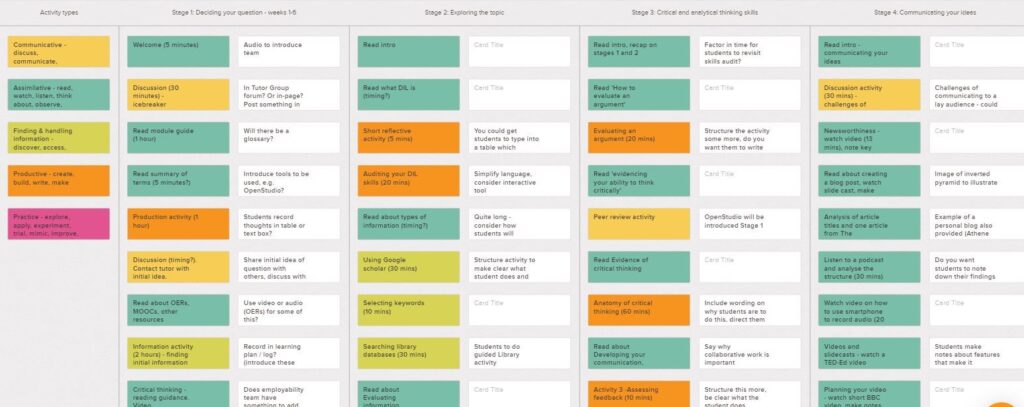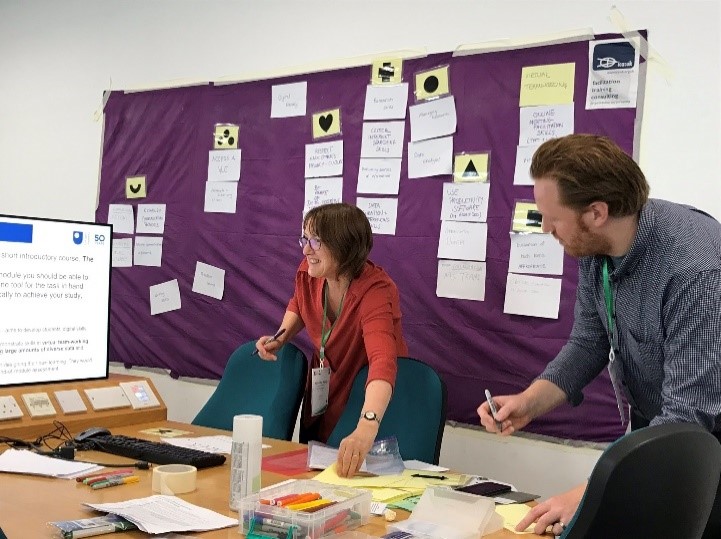The Open University approach to designing for learning puts a strong focus on knowing who the learners are, catering for their needs and supporting them to succeed. One of the strengths of the OU is that its students are very diverse – the OU’s mission is to be open to people, places, methods and ideas – but it does also mean that our curriculum teams can’t assume a common baseline when they start creating new learning materials. OU courses therefore build in opportunities into the learning journey for students to develop their skills alongside their subject knowledge.
Planning the student journey
A commonly used approach by OU Learning Designers is to lead teams through a set of activities focusing on what we call the ‘student journey’ – everything that students will experience on an individual module (or part of it) and how this flows and fits together. This allows module teams to walk in students’ shoes and consider how they’ll experience the learning.
As we look at the student journey we ask a series of questions, including the following:
- What is the desired end point (assessment) and what is the process of getting there?
- What should students be able to do at the end of the module or qualification and how will we and they know they can do it?
- What learning activities will enable them to prepare for the final assessment?
- What are the likely stumbling blocks and pressure points?
- What creative assessment formats could be suitable? Although traditionally an essay or report has been used to assess learning across different disciplines, increasingly teams are offering students more relevant and digital forms of assessment such as creating blogs, videos or podcasts. These enable students to demonstrate their learning in an authentic way, while also preparing them for professional life. The life-wide skills, attributes and behaviours gained are more important than ever in the current challenging climate.
Frameworks: a starting point
At the OU, we’ve developed institutional frameworks for digital and information literacy (DIL) and employability. These frameworks set out the range of skills and attributes that students need, not just for study purposes, but also for work and life more generally. These frameworks fit well with the OU learning design activity types framework, which prompts teams to identify active learning approaches to engage students with subject content.
Frameworks are a helpful starting point, but experience shows that they need mediating and facilitating for educators to contextualise and integrate the skills in their context (Reedy and Goodfellow, 2014; Bennett and Folley, 2018). Curriculum teams can also struggle to take in what may feel like a lot of information when considering the full range of employability, DIL and academic study skills. How can they make sense of it all and ensure that skills development is well planned and scaffolded for the learner?
Planning student skills development
In response to these challenges, we’ve developed a set of skills cards – similar to playing cards – to help module teams visualise the student journey and identify which skills and attributes should be integrated. The cards use the OU’s employability and DIL frameworks, and also bring in core skills for academic study such as note-taking, reading critically or preparing assignments.
There are three sets of cards (all links will open in a new tab):
- Academic study skills cards
- Digital and information literacy skills cards
- Employability skills cards.
All are available to download and share under a Creative Commons licence. Download our guide to using the skills cards for initial support.
We use the cards in a variety of settings, from our initial learning design workshops at the start of module planning to specialist student journey workshops focusing on a block of learning or a particular event, such as an online residential school (see below for examples of how we’ve used the cards). Library and employability specialist consultants contribute to these by communicating and contextualising the various skills for different disciplines and advising teams about suitable activities to include.
My OU Library colleague Hossem Kassem and I talk about some of our OU approaches in the webinar Embedding digital literacy in the curriculum (held December 3 2020) which forms part of Dr Jane Secker’s module for City University on Digital literacies and Open Practice. The recording is freely available to all.
We’ve found that the physical nature of the cards provides a visual aid that teams of educators can see and discuss, which in turn helps them come to a shared view. This approach can be augmented by use of consensus-building facilitation techniques, such as those taught by ICA (the Institute of Cultural Affairs) to prioritise the most important skills to focus on.
If we clearly identify skills during the learning design process, students – who may not have had the opportunity to learn these skills prior to OU study – can be supported with study requirements and feel empowered to succeed.
How we’re using the cards
We’ve used skills cards in workshops to help teams in a variety of ways, including:
- prioritising the relevant skills
- considering how skills should be introduced at particular points in the student journey
- developing suitable activities which engage students with the subject content.
When the sets of cards are laid out side by side it’s easy to see the overlaps between different types of skills and to gain insights into how they complement each other. It also helps educators to bring their subject matter to life and engage students actively.
One learning activity for students may include a number of different skills. For example, students on an OU module in marketing carry out tasks which involve researching their subject, creating digital outputs, providing peer feedback to others through online platforms, and reflecting on the process.
Doing it online
At the time of writing, much teaching and learning is taking place online, and the design of new courses is done remotely through online workshops and meetings. This online collaboration between educators is in itself a key employability skill. The OU has always been quick to adopt different technologies for distance learning and teaching. It was therefore an easy and natural step to use online platforms to look at the student journey, including skills. We hope in future to create an interactive version of the skills cards – watch this space. Meanwhile, they are free to download from the Resources section of this blog. They can be easily adapted for use in online workshops using a shared space to capture the relevant skills and come to a common understanding within curriculum teams.

References
Bennett, E. and Folley, S. (2018) ‘D4 curriculum design workshops: a model for developing digital literacy in practice’ in Digital Literacy Unpacked, Facet Publishing, 2018. Available from ResearchGate at: https://www.researchgate.net/publication/326352898_D4_Curriculum_Design_Workshops_a_Model_for_Developing_Digital_Literacy_in_Practice (accessed 1 December 2020).
Reedy, K. and Goodfellow, R. (2014) “’You’ve been frameworked”: evaluating an approach to digital and information literacy at the Open University’, Journal of Learning Development in Higher Education, Special Edition: Digital Technologies, pp. 1-18.
Useful links
Digital and information literacy skills cards


